Words of Wisdom - Shastra
& Shastrakaras speak
For Books and shastra downloads see Main Index, under
Books:
Om Namo Bhagavate Vasudevaya
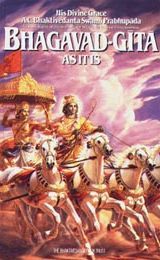

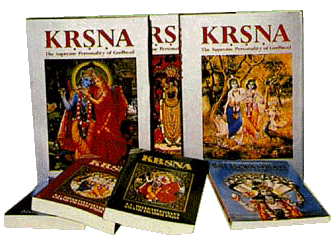
The Complete Works of Srila Prabhupada
All the books, the letters and conversations at your
fingertips
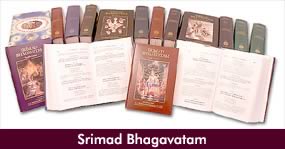
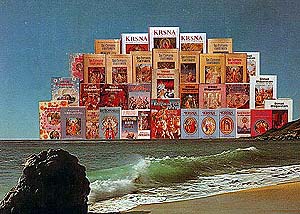
All Srila Prabhupada's books and more on one disk
http://www.vedabase.com




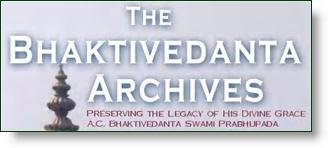
Srila Prabhupada's Audio lectures to listen to on-line:
http://www.hare-krishna.org/srila-prabhupada-lectures.htm
Listen to Srila A.C. Bhaktivedanta Swami Prabhupada on-line
- all 900 of his lectures are available HERE:
http://www.prabhupadavani.org/
Srimad Bhagavatam - the entire lecture series listen and
read along on-line - Narrated by Amala Bhakta dasa:
http://www.prabhupadavani.org/SB_index.html
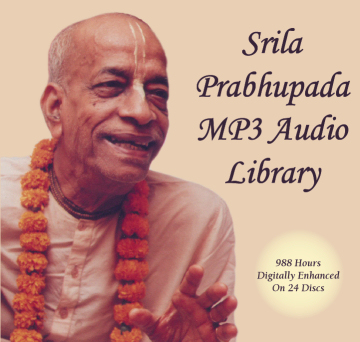
The new enhanced Prabhupada MP3 series
http://www.prabhupada.com/store/store.php?page=product.php&id=MP3AUDIOLIB

Srila Prabhupada Vyasa-puja book 2007
http://www.krishna.com/node/1048
Vyasa-puja is an annual celebration by the devotees of Lord Krishna
to offer homage to their guru, or spiritual teacher.
There are two versions of the Vyasa Puja Book based on the speed of
your internet connection.
If you are unable to open the file, download Acrobat Reader.
High speed connections, with pictures.
Vyasa-puja
Book 2007 [PDF/ZIP, 2.11MB]
Low speed connections, no pictures.
Vyasa-puja
Book 2007 (no pictures) [PDF/ZIP, 2.11MB]








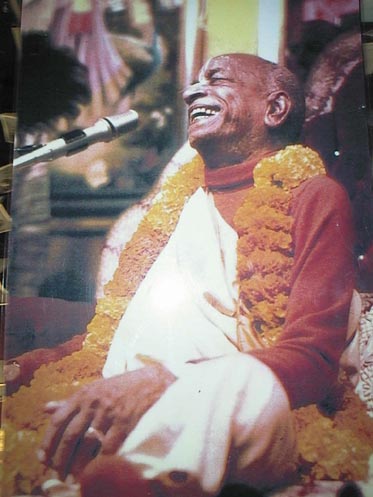
Visit "Prabhupada Connect" for all manner of Prabhupad
Nectar:
http://www.prabhupadaconnect.com/Index.html
Srila Prabhupada's Final Lesson Video - Downloadable and
viewing on-line
http://users.iskconludhiana.com/images/thumbnails.php?album=21


All Srila Prabhupada's original books
available for sale here.

Download all the Hare Krsna teachings which includes
all Vaisnava and
Vedic concepts by visiting one of the sites listed at
the following address.
http://www.geocities.com/suci123/bookdownloadsites1.html
The Bhaktivedanta Book Trust
Srila Prabhupad Memorial Library
http://www.krishna.com/main.php?id=33


33 Books Online Including Srimad Bhagavatam!
http://www.geocities.com/freeprabhupadabooks
The compressed "self extracting" file mentioned is now currently
available for download
http://www.krsnaconsciousness.org/Gauranga/Folio/BhaktivedantaVedabase_DOS.exe

Download or Listen to Prabhupad Bhajans HERE:
http://www.prabhupadavani.org/web/text/Bhajans.html


On-line 1972 McMillan edition - Bhagavad Gita As It Is:
http://www.asitis.com/

Bhagavad Gita AS IT IS on-line through the Tirupathi
Balaji site:
http://www.bhagavad-gita.us/

Bhagavad Gita Study guide on-line book:
http://chantandbehappy.com/gita/studyguide/StudyGuide-main.htm
Bhagavad Gita Study guides by numerous Iskcon devotees
- FREE downloads:
http://www.veda.harekrsna.cz/library/#3

All the Scriptures you'd ever need 4 FREE
http://www.hknet.org.nz/index-books.htm
http://www.hknet.org.nz/DDB.htm
http://www.hknet.org.nz/DDB2.html
last updated 4th August 2003


Srimad Bhagavad Gita AS
IT IS
Bhagavad Gita: Chapter
6 - Dhyana-yoga
TEXT 36
asamyatatmana yogo
dusprapa iti me matih
vasyatmana tu yatata
sakyo 'vaptum upayatah
WORD FOR WORD
asamyata--unbridled; atmana--by the mind; yogah--self-realization;
dusprapah--difficult to obtain; iti--thus; me--My; matih--opinion; vasya--controlled;
atmana--by the mind; tu--but; yatata--while endeavoring; sakyah--practical;
avaptum--to achieve; upayatah--by appropriate means.
TRANSLATION
For one whose mind is unbridled, self-realization is difficult
work. But he whose mind is controlled and who strives by appropriate means
is assured of success. That is My opinion.
PURPORT
The Supreme Personality of Godhead declares that one who
does not accept the proper treatment to detach the mind from material engagement
can hardly achieve success in self-realization. Trying to practice yoga
while engaging the mind in material enjoyment is like trying to ignite
a fire while pouring water on it. Yoga practice without mental control
is a waste of time. Such a show of yoga may be materially lucrative, but
it is useless as far as spiritual realization is concerned. Therefore,
one must control the mind by engaging it constantly in the transcendental
loving service of the Lord. Unless one is engaged in Krsna consciousness,
he cannot steadily control the mind. A Krsna conscious person easily achieves
the result of yoga practice without separate endeavor, but a yoga practitioner
cannot achieve success without becoming Krsna conscious.
His Divine Grace A.C. Bhaktivedanta Swami Prabhupada
Copyright 1983 The Bhaktivedanta Book Trust International. Used with
permission.

Bhagavad Gita As It Is - http://www.asitis.com/
Bhaktivedanta Vedabase - Bhagavad Gita on-line http://bhagavadgitaasitis.com/
Bhaktivedanta VedaBase: Bhagavad-gita As It Is http://vedabase.net/bg/en
Bhagavad Gita Multi Media Web-version http://chantandbehappy.com/gita/
Listen to Bhagavad Gita on line - http://www.Gitamrta.org
View our Bhagavad Gita Overview:
http://www.hknet.org.nz/BG.html
Archive: http://www.cs.rice.edu/~vivek/btg/archive/
Home Page: http://www.cs.rice.edu/~vivek/btg/
Join Bhagavad Gita eGroups HERE
mailto:bhagavad_gita-owner@egroups.com


Prabhupada Uvacha:
(here's some nectar, sometimes it comes in the form of Srutakirti prabhu's
diary, other times from Govinda dasi's diary, Hari Sauri prabhu's Transcendental
Diary, Bhurijan prabhu's book, or sometimes from a letter, or other related
source, but still nectar...)
An evening lecture
On one of his last evenings in Hamburg, Srila
Prabhupada lectured on the need to inquire about solving the problems of
material existence. Such inquisitiveness, he said, differentiates human
and animal consciousness. After giving some examples of how an advanced
civilization finds solutions to problems, he asked his audience, "So what
is the ultimate problem? The ultimate problem is we do not want to suffer.
That's all. We want a comfortable, peaceful life. This is the ultimate
problem. Is it not? Just think it over. In Sanskrit it is called atyantika-duhkha-nivrttih:
to solve the problem of miseries. We don't want any kind of misery. We
don't want to suffer. We want a very peaceful and joyful life. But that
is not possible within this material world. That is the problem."
He gave one of his favorite examples to illustrate
the fleeting nature of material happiness-John F. Kennedy: "He had a very
nice wife, children, honor, prestige, everything. He was riding in procession,
people were honoring him, and within a second-finished."
After enumerating more problems that people face,
Srila Prabhupada asked his audience, "Then what is the solution? That solution
is there in Bhagavad-gita, in the seventh chapter, fourteenth verse: 'This
divine energy of Mine, consisting of the three modes of material nature,
is difficult to overcome. But those who have surrendered unto Me can easily
cross beyond it.' Yes. The solution is we have to surrender unto the Supreme.
Just like if you are arrested by the police, then it is very difficult
to get out of their clutches. But if you are a good citizen, a soul surrendered
to the state, there is no problem. The police have nothing to do with you.
Is it very difficult to understand?"
Prabhupada impressed upon his listeners the urgency
to perfect their lives: "So before death overcomes you, you make a solution
to the problem. Those who have come in touch with Krsna consciousness and
have been initiated should be very determined that 'In this life we shall
make a solution. No more coming back again to the cycle of birth and death.'
That should be our determination. We should be determined to make a solution
and go back home, back to Godhead, where we get an eternal, blissful life
of knowledge. This is the sum and substance of our Krsna consciousness
movement."
When Srila Prabhupada asked for questions, one
devotee asked if it was possible to become Krsna conscious in this very
lifetime. "It is possible in one second, provided you are serious," Prabhupada
said. "It is not difficult. Bahunam janmanam ante jnanavan mam prapadyate:
'After many, many births, when one is intelligent, wise, fully grown in
wisdom, he surrenders unto Me,' Krsna says. So if I am intelligent, then
I will see: 'If that is the goal of life, that after many, many births
one has to surrender to Krsna, why not surrender myself immediately?' This
is intelligence. Why shall I wait for many, many births if this is a fact?
So that requires a little intelligence. It does not require many, many
births. It requires a little intelligence. Take to this Krsna consciousness
seriously; then your problems are solved. Now, if you don't believe in
it, then come to argument, come to philosophy, come to reason. Go on arguing.
There are volumes of books. You can be convinced. You can learn it. Every
answer is there in the Bhagavad-gita. You can try to understand it with
your reason, with your arguments."
Srila Prabhupada then added a fascinating explanation
about relativity: "So it requires relative intelligence. This world is
relative. One can become immediately Krsna conscious, within a second,
or one may not become Krsna conscious even after many, many births. So
it is relative. If you have got sufficient intelligence, you can accept
it immediately. If there is less intelligence, then it will take time.
You cannot say that 'It will be possible after so many years.' That cannot
be said. It is relative. Everything is relative. For a human being, from
here to here, one step; and for a small microbe, it is ten miles from here
to here, ten miles for him. So everything is relative. This world is a
relative world. There is no such formula that 'One can be Krsna conscious
after so many years.' No. There is no such formula. One may not become
Krsna conscious even after millions of births, and one can become Krsna
conscious within a second. But within this life we can become perfect in
Krsna consciousness, if we take it seriously. Especially you are all young
boys. We expect you'll live at least fifty more years. Oh, that is sufficient
time. Sufficient. More than sufficient. More than sufficient. If for fifty
years one chants simply 'Hare Krsna, Hare Krsna,' he is sure to become
perfect. There is no doubt about it. Simply if you chant this mantra, Hare
Krsna-oh, there is no doubt about it."
Next, a question was asked why some people accept
Krsna consciousness and some do not. Prabhupada repeated that the choice
is ours. If something stopped us, it was maya, and the only remedy was
to take shelter of Krsna more strongly by chanting Hare Krsna. He appealed
to his listeners to induce people to chant Hare Krsna; they would receive
the real thing and become happy.
"Don't be misled that, 'There are no problems
in life. We are very happy-eating, sleeping, mating.' This is animal life.
There are so many great problems. Very great problems: birth, death, old
age, disease-and repeatedly. Bhutva bhutva praliyate: the universe is manifested,
again nonmanifested, again manifested, again nonmanifested. So stop this
problem. Yad gatva na nivartante tad dhama paramam mama: go to Krsna's
abode. And what is the difficulty? You do your own work and chant Hare
Krsna. We don't say that you stop your business, stop your occupation.
You remain. Just like he is a teacher [pointing to Hayagriva]-all right,
he is a teacher. He [referring to Krsna Dasa] is a jeweler-remain a jeweler.
He's something. He's something. That doesn't matter. But be Krsna conscious.
Chant Hare Krsna. Think of Krsna. Take Krsna prasadam. Everything is there.
And be happy. That is our propaganda. You learn yourself and preach this
cult. People will be happy. Simple method."
- From the "Srila Prabhupada and His Disciples
in Germany" by HG Vedavyasa dasa
To receive little snippets of nectar like this on a daily basis subscribe
HERE: or If you want to introduce anyone else in reading Srila Prabhupada
Nectars, please send their eMail addresses to mailto:krpamaya_gauranga@hotmail.com
Please Chant:
 Hare
Krishna Hare Krishna Krishna Krishna Hare Hare
Hare
Krishna Hare Krishna Krishna Krishna Hare Hare
 Hare
Rama Hare Rama Rama Rama Hare Hare
Hare
Rama Hare Rama Rama Rama Hare Hare
...................and be Happy

Listen to Srila Prabhupad on-line
....a different lecture, morning walk, conversation or
class daily.
"The Rented House"
75/10/13 Durban, Bhagavad-gita 13.1-3
Listen to the entire lecture on-line:
http://prabhupadaradio.com/M3U/Gita/m3u/GT284.m3u
Prabhupada: Om namo bhagavate vasudevaya. We are reading
one chapter from Bhagavad-gita, thirteenth chapter. The subject matter
is nature, the enjoyer, and consciousness. In Sanskrit it is called ksetra-ksetra-jna.
Ksetra means the field. Just like an agriculturist. They work on the field.
The worker or the agriculturist owns the land, and he works there, and
according to his labor he enjoys the fruits. Similarly, we have been given
this body as the field of activity. Every one of us, not only human being,
but also other living entities...
There are eight million four hundred thousand forms of
living entities. Jalaja nava-laksani. In the water there are nine hundred
thousand forms of living entity. Then, jalaja nava-laksani sthavara laksa-vimsati.
Sthavarah means the living entities who cannot move, just like the trees,
plants, grass, vegetables. They are standing in one place. They are also
called "having no leg." Ahastani sahastanam apadani catus-padam. This is
nature's law, that the living entities which have no hands, they are eatable
for the living entities who have hands. Ahastani sahastanam apadani catus-padam.
And the living entities which cannot move, they are the food for the living
entities which has got four legs. Phalguni mahatam tatra jivo jivasya jivanam.
In this way the weak is the food for the strong. This
is the law of nature, that one living entity is the food for another living
entity. So when a person eats another living entity, it is not unnatural.
This is nature's law. But when you come to the human form of living entity,
you must use your discrimination. Just like one living entity is food for
the another living entity. It does not mean... In the lower animals sometimes
the father-mother eat the offspring, but in the history of human society
it has not come into notice that the father and mother eating the offspring.
But time has come when the mother is killing offspring. That has come already.
This is due to Kali-yuga.
So here Arjuna's question is to understand the field and
the worker on the field. He questions, arjuna uvaca, Arjuna inquired from
Krsna,
prakrtim purusam caiva
ksetram ksetra-jnam eva ca
etad veditum icchami
jnanam jneyam ca kesava
Krsna's another name is Kesava. So he is addressing Krsna,
"My dear Kesava, I want to know these subject matters -- prakrti, purusa."
Prakrti means nature, material nature, and purusa means the enjoyer, just
like the living entities. We are trying to enjoy this material nature.
Another prakrti-purusa... Purusa means, real purusa means, the supreme
enjoyer, God, Krsna. And prakrti means which is enjoyed. Another meaning
-- prakrti, means woman and purusa means man. So this material world is
going on -- one party is trying to enjoy, and the other party is being
enjoyed.
So Arjuna wanted to know what is the distinction, what
is the integral part and parcel of this prakrti and purusa. Then ksetram
ksetra-jna. Jna means one who knows, and ksetra-jna means one who knows
the field. Just like the agriculturist, the cultivator, he knows that "This
is my field." He works there. Different cultivator works in his own field.
So this ksetra means this body, ksetra, the field of activity. We have
got different field of activities. So ksetram ksetra-jnam ca, ksetram eva
etad veditum icchami: "My dear Krsna, I want to know from You." Why he
wants to know from Krsna? Because Krsna is infallible. Whatever knowledge
we get from the infallible, that is perfect knowledge.
Ordinary human being, they are not perfect. Ordinary human
being, they are subjected to four deficiencies. We are ordinary human being;
we commit mistake. That's a fact, every one of us. We are illusioned. Our
senses are imperfect, and with all this paraphernalia, when we want to
teach, that is not teaching; that is cheating. Because I am imperfect,
how can I be teacher? That is not possible. Therefore we have to learn
from a person who has no defects in his life or a liberated person. Liberated
person means he does not commit mistake, he is not illusioned, he does
not cheat and his senses are not imperfect. This is the four signs of liberated
person.
So our process, the Krsna consciousness movement, means
we take knowledge from Krsna who is liberated from these four kinds of
deficiencies. That knowledge is perfect. Similarly, Arjuna is also inquiring
from Krsna. Etad veditum icchami. Etad veditum icchami jnanam jneyam ca
kesava. What is actual knowledge and what is the subject matter of knowledge.
That means six questions are presented by Arjuna before Krsna. One pair,
prakrti-purusa, ksetra-ksetra-jna, and jnanam jneyam, what is knowledge
and what is the subject matter of knowledge. Six questions. Sri bhagavan
uvaca. Now, here Krsna is speaking, but Vyasadeva, who recorded this dialogue
between Krsna and Arjuna, he is writing, "bhagavan uvaca." He does not
say, "krsnah uvaca." "Krsna" may be misunderstood. But Krsna is bhagavan.
He wants to stress on this point.
Krsnas tu bhagavan svayam. In the Srimad-Bhagavatam it
is stated by Vyasadeva that krsnas tu bhagavan svayam. Similarly, in the
Brahma-samhita it is stated, isvarah paramah krsnah [Bs. 5.1]. Isvara means
controller. So parama means the supreme. So every one of us, we are more
or less controller. But we are not supreme controller. We must know this.
Isvarah paramah krsnah [Bs. 5.1]. There are some men who claim to become
Isvara, to become God. So we have no objection, that if somebody says,
"I am God," or "I am controller," we have no objection. But if somebody
says that "I am supreme God," or "supreme controller," then we have got
objection. Supreme means he has no controller. And ordinary controller,
just like we are... You are controller. You are controlling some sphere
of life. I am also controlling some. But I also being controlled.
But isvarah paramah krsnah [Bs. 5.1] means He is the supreme
controller. He has no controller over Him. He controls everyone, but He
is not controlled by anyone. Therefore it is called
isvarah paramah krsnah
sac-cid-ananda-vigrahah
anadir adir govindah
sarva-karana-karanam
[Bs. 5.1]
These are the Vedic statement. And our process of knowledge,
Veda... Veda means knowledge. Vetti veda vido jnane. Supreme knowledge,
perfect knowledge, that is Veda. So Krsna is the supreme person. He is
the speaker of Vedas. The subject matter of Vedas is to know Krsna. Vedais
ca sarvair aham eva vedyah [Bg. 15.15]. If you are a student of Vedas,
then you must have clear conception of God. That is real knowledge, no
vague idea, but clear conception. That is knowledge, Vedic knowledge, ultimate...
Therefore the Vedanta philosophy. Veda means knowledge, and anta means
the ultimate. Everything has got ultimate. So Vedanta means the ultimate
knowledge of Vedas. That is stated in the Bhagavad-gita. You will find
in the fifteenth chapter. Vedais ca sarvair aham eva vedyo vedanta-vid
vedanta-krd ca aham. [break]
continued..........
Listen to the entire lecture on-line:
http://prabhupadaradio.com/M3U/Gita/m3u/GT284.m3u
or receive in mailbox and Subscribe HERE:
mailto:lectures-subscribe@prabhupadavani.org
Sravanam kirtanam at:
http://www.PrabhupadaVani.org
© 2001 The Bhaktivedanta Book Trust International. Used with permission.

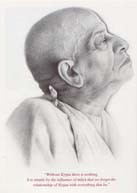
SRILA PRABHUPADA'S QUOTE OF THE DAY
He is thinking he is more than them.
That means rascal, over intelligent. Over intelligent means rascal. Intelligence
means you must have reason. And if he is going beyond reason, only depending
on himself, then he is over intelligent rascal. You understand over intelligent
rascal? Don't be over intelligent. That is very risky. Be intelligent.
Over intelligent means rascal. Spoiling. Just like milk. You are heating,
and if you give overheat, spoil so many. That kind of heating is not required.
You just push on heat as much required. Otherwise you'll spoil by your
intelligence.
Room Conversation -- Fiji 1976
Sign-up to receive these quote HERE:
mailto:haribol@pacific.net.sg

Bhaktivedanta Vedabase Network ...
http://vedabase.net/


The Scientific - Mathematical
Proof for God's existence:
http://geocities.com/sector114

http://robot-hosting.com/php/login_nicholas.html
user name = guest
password = guest
(Collection of philosophical and mathematical proofs
for existence of God can be found in this site.)

Scientifically Philosophical Books for the layman
 ...
...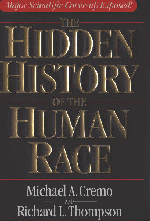 ...
...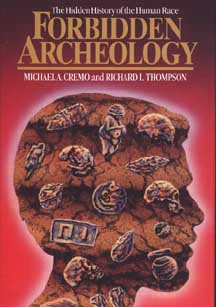 ...
...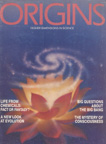
Click on any of these books to read more about them and where to get
a copy
or contact your local temple for purchases
sample of Life
comes from Life HERE.pdf

Lotus Imprints - Preserving Prabhupada's Legacy - The
Publishing House of Hari Sauri dasa
http://www.lotusimprints.com/

Quotes from Shastra - scriptures
View using Balaram font
Chaturmasya Vrata
"The Cäturmäsya period
begins in the month of Äñäòha (June-July) from
the day of Ekädaçé called Çayanä-ekädaçé,
in the fortnight of the waxing moon. The period ends in the month of Kärtika
(October-November) on the Ekädaçé day known as Utthänä-ekädaçé,
in the fortnight of the waxing moon. This four-month period is known as
Cäturmäsya. Some Vaiñëavas also observe it from the
full-moon day of Äñäòha until the full-moon day
of Kärtika. That is also a period of four months. This period, calculated
by the lunar months, is called Cäturmäsya, but others also observe
Cäturmäsya according to the solar month from Çrävaëa
to Kärtika. The whole period, either lunar or solar, takes place during
the rainy season. Cäturmäsya should be observed by all sections
of the population. It does not matter whether one is a gåhastha or
a sannyäsé. The observance is obligatory for all äçramas.
The real purpose behind the vow taken during these four months is to minimize
the quantity of sense gratification. This is not very difficult. In the
month of Çrävaëa one should not eat spinach, in the month
of Bhädra one should not eat yogurt, and in the month of Äçvina
one should not drink milk. One should not eat fish or other nonvegetarian
food during the month of Kärtika. A nonvegetarian diet means fish
and meat. Similarly, masüra dhal and urad dhal are also considered
nonvegetarian. These two dhals contain a great amount of protein, and food
rich in protein is considered nonvegetarian. On the whole, during the four-month
period of Cäturmäsya one should practice giving up all food intended
for sense enjoyment."
Sri Chaitanya Charitamritam Madhya
lila 4:169 purport.
See more about Chaturmasya BELOW:


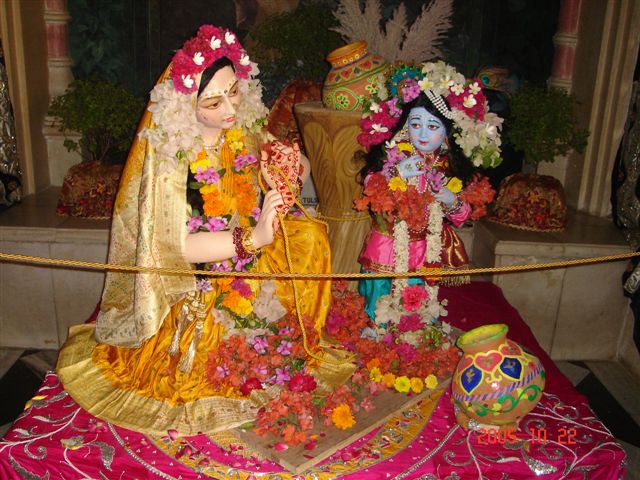

 The
Month of Karttika Begins
The
Month of Karttika Begins
Festivals in the Holy Month of Karttika
(27th October - 24th November 2007 )(in NZ)
 Information
about the Karttika vratam:
Information
about the Karttika vratam:
 Kartika
Mahatmya from Hari Bhakti Vilas: - all the benefits of the month of Kartika
Kartika
Mahatmya from Hari Bhakti Vilas: - all the benefits of the month of Kartika
 Bahulastami
- Radha kunda snan dan
Bahulastami
- Radha kunda snan dan
 Diwali
- Dipavali - Dip dan - Akash Dipa (Significance of the various days
of the Diwali period):
Diwali
- Dipavali - Dip dan - Akash Dipa (Significance of the various days
of the Diwali period):
 Go-puja
- Go Krd
Go-puja
- Go Krd
 Govardhan
Puja - Annakuta
Govardhan
Puja - Annakuta
 Srila
A.C. Bhaktivedanta Swami Prabhupada's Tirubhava - Commemorative day of
His passing - Samadhi - Vrindavan
Srila
A.C. Bhaktivedanta Swami Prabhupada's Tirubhava - Commemorative day of
His passing - Samadhi - Vrindavan
 Padma
Purana on Kartika Vrata
Padma
Purana on Kartika Vrata
 Quotes
from the Dik-darshini tika commentary of Srila Sanatan Goswami, on Srila
Gopal Bhattar Goswami's Hari Bhakti Vilas.
Quotes
from the Dik-darshini tika commentary of Srila Sanatan Goswami, on Srila
Gopal Bhattar Goswami's Hari Bhakti Vilas.
 Significance
of each of the Days of Kartika
Significance
of each of the Days of Kartika
 Glories
of Kartika from Srila Rupa Goswami and Srila A.C. Bhaktivedanta Swami Prabhupada
Glories
of Kartika from Srila Rupa Goswami and Srila A.C. Bhaktivedanta Swami Prabhupada
 Damodara
vrata
Damodara
vrata
 Damodarastakam
Tika of Sanatan Goswami
Damodarastakam
Tika of Sanatan Goswami
 Bhishma
panchaka fast for Karttika
Bhishma
panchaka fast for Karttika
 Haribodhini
(Prabodhini) ekadasi - When the Lord wakes up
Haribodhini
(Prabodhini) ekadasi - When the Lord wakes up
 The
glories of the Month of Karttik - in one .pdf file - a must read
The
glories of the Month of Karttik - in one .pdf file - a must read
 How
the followers of Madhwacharya follow the Festivals of Kartika (2005)
How
the followers of Madhwacharya follow the Festivals of Kartika (2005)
 Navaratri
and Dusserha
Navaratri
and Dusserha
 Shaligram
Tulasi Vivaha
Shaligram
Tulasi Vivaha
All pictures from Srimad Bhagavatam above - Copyright ©2005 The
Bhaktivedanta Book Trust
International, on the web at .http://www.krishna.com/.
Used with permission.
Courtesy of http://www.vedabase.com/
used
with permission

The Chaturmasya Vrata from
Haribhakti Vilasa
15th vilasa
Caturmasya Benefits
Bhavisya Purana- "One who passes the Chaturmasya
season without observing religious vows, austerities and chanting of japa,
such a fool although living should be considered to be a dead man."
Kanda Purana, Nagava Khunda- "In the month of shravana
(July, August) one should refrain from eating spinach. In the month
of Bhadra (August, September) of yogert in Ashvina (September, October)
milk. In Kartik (October, November) meat and urd dall.
Various vows and austerities during Chaturmasya and Their
respective results.
"O King, one who is My devotee and is fixed in vow, whether
man or woman, for the purpose of Dharma, should accept these various austerities
and observances. I shall now describe to you all of them along with their
respective results.
1) No salt—One's voice becomes sweet.
2) No oil—One's life is prolonged and gets progeny.
3) No oil massages—One's body becomes beautiful.
4) No cooking with oil—One's enemies are vanished.
5) No licorice and oil—One becomes wealthy.
6) Give up wearing unoffered flowers—One becomes a Vidyadhara
in Devapura.
7) Give up six kinds of tastes (spice, sour, bitter,
sweet, salty and harsh)—One never becomes ugly, smelly, or obtains a bad
birth.
8) Practice of yoga—One goes to Brahmaloka.
9) No betal nuts—One becomes happy.
10) No cooked food (raw fruits & Vegetables)—One
obtains purity.
11) No honey—One becomes lustrous.
12) No yogert or milk—One attains Goloka.
13) No cooking with earthen pots—One gets ... (?)
14) No hot food—One gets offspring with a long life.
15) Take rest on the ground or on stone—One becomes an
associate of Vishnu.
16) One who gives up meat & honey is a yogi and muni.
17) No intoxicating liquors—One becomes powerful and
free from disease.
18) Fast for one day—One is honored in Brahmaloka.
19) No cutting of hair and nails—One gets the benefit
of taking bath daily in Ganges.
20) No speaking of grama katha (nonsense)—One's order
will never be disobeyed.
21) Eat food on the ground without dish or plate—One
obtains a kingdom on Earth.
22) Chant the mantra Namo Narayana—One obtains the result
of giving in charity 100 times.
23) Offer prayers to the Lord—One gets the result of
giving cows in charity.
24) Touch the lotus feet of the Deity—One becomes a successful
person.
25) Clean the temple of the Lord—If one is king he remains
so for a Kalpa.
26) Circumambulating the temple three times offering
prayers—At the time of death one will mount a swan airplane and go to Vaikuntha.
27) Singing or playing musical instruments in the temple
of the Lord—One goes to Gardharvaloka.
28) Take pleasure in studying the sastras—One goes to
Vishnuloka.
29) Sprinkle water in the temple—One goes to apsaraloka.
30) Take bath in a holy place—One's body becomes pure.
31) Worship Lord Vishnu with flowers—One goes to Vaikuntha.
32) Eat panchagavya—One gets the result of observing
candrayana fasting.
33) Eat one meal a day—One gets the results of performing
an Agnihotra.
34) Eat at night only—One gets the result of going to
all the places of pilgrimage.
35) Eat at noon only—One attains Devaloka.
36) Take food not obtained by begging or any extraneous
endeavor—One gets the results of opening water stands and digging wells.
37) Take bath daily—One will never see hell.
38) No eating on a plate—One gets the result of bathing
at Pushkara
39) Eat on a leaf—One obtains the result of living at
Kurukshetra.
40) Eat on a stone—One obtains the result of bathing
at Prayog.
41) Giving up drinking to six hours—One will not be attacked
by diseases.
42) During the Chaturmasya, garlands, caranamrta, candana
and water from the conshell of the Lord, mahaprasädam, Deity garlands
must be accepted.
In this way one who performs this vrata for the satisfaction
of Lord Kesava becomes satisfied himself. O best of the Pandavas, among
My devotees, he who accepts these vows and austerities during the Chaturmasya
goes to my abode at the time of death, of this there is no doubt.
Vishnu Rahasya- Lord Brahma to Narada Muni.
If one accepts all these Vaisnava austerities and
observances with devotion, one attains the supreme destination O Narada.
One who desires within himself to execute all these Vaisnava austerities
and vows, his sins obtained within one hundred births is destroyed. If
one is exclusively devoted, peaceful, takes daily bath, is fixed in vow
and worships the Lord during these four months, he goes to the abode of
the Lord. He who accepts the austerity of sleeping on the ground this time
when the Vishnu Deity is sleeping in yoga nidra underwater, he goes to
the abode of Laxmi.
Read more about vrata, sankalpa and Chaturmasya in general
HERE
Chaturmasya-info-Madhwas.html
Chaturmasya-vrata.html

The vows of Chaturmasya and Kartika are not optional, but should be
observed by all, as noted in Hari-bhakti-vilasa (16.19):
niyamena vinA caiva yo nayet kArttikaM mune |
cAturmAsyaM tathA caiva brahma-hA sa kulAdhamaH ||
"He, who lives through the periods of Karttika and Chaturmasya without
vows is indeed the killer of a brahmin and the lowest of his dynasty."
Jiva Goswami quotes (BhS 270) on the best of austerities from the Caturmasya
Mahatmyam of Skanda Purana:
tathA caivottamaM loke tapaH zrI-hari-kIrtanam |
kalau yuge vizeSeNa viSNu-prItyai samAcaret ||
"Certainly in this world, the best of all austerities is Sri Hari-kirtana.
Especially in the age of Kali, it is to be done for the satisfaction of
Vishnu."
Many householders, busy as they are in their daily routines and work,
may not find the time for kirtan every day. In the four months of Chaturmasya,
one should, as the most important of all vows, endeavor to engage daily
in kirtan. If the Lord is not glorified and remembered, of what use are
the varieties of ritual observances, of which the primary intent is to
prepare the mind for those very activities?

All pictures from Srimad Bhagavatam and Iskcon works - Copyright ©2005
The Bhaktivedanta Book Trust
International, on the web at .http://www.krishna.com/.
Used with permission.









![]()
![]()
![]()
![]()

![]()
![]()
![]()
![]()

![]()
![]()
![]()
![]()
















